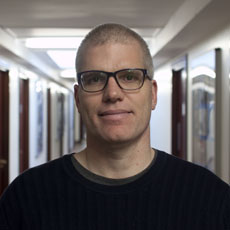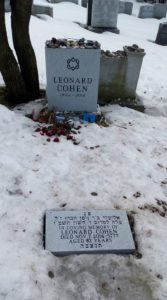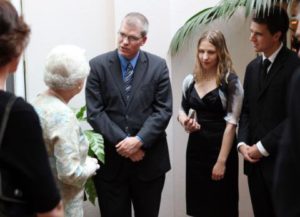1. What is your role within the History department?  I’m a Senior Lecturer and teach a range of modules plus I’m public engagement lead for the School and I serve on an ethics review panel for the university.
I’m a Senior Lecturer and teach a range of modules plus I’m public engagement lead for the School and I serve on an ethics review panel for the university.
2. What are your research interests? Broadly, the history of security and intelligence in a US, Canada, and UK context. This includes things such as surveillance, counter-terrorism, terrorism, subversion, informants, policing, and intelligence agencies.
3. Where did you study (UG, PGT, PGR etc.)? I did my first two years of university at Carleton University in Ottawa, Canada. Because residence places were limited, I ended up living far away from campus and ended up feeling extremely isolated and really depressed by the end of my second year so I transferred to Wilfrid Laurier University in Waterloo, Ontario and ended up living at home and feeling extremely isolated and depressed. It was only once I headed off to grad school that I began to break free of some of these patterns and live as an adult. Grad school involved moving to another part of Canada to study at the University of Saskatchewan in the city of Saskatoon, Canada (which, as I endlessly point out to people, is on the same latitude as Birmingham). Saskatoon was about a 35-hour drive from where I grew up or 3.5 hours by plane so it was a big move and the best decision I ever made in terms of my own personal development.
4. Did you always know you wanted to go to university or in to academia? No, I didn’t. In my family, only my father had ever gone to university and he did a two-year agricultural degree. My parents certainly believed in education and were supportive but neither had much in the way of understanding of what I was doing and this only escalated once I went off to grad school. Both sides of my family were farmers and there’s always been more of an appreciation of what people did with their hands than with their minds in my family.
5. How long did it take and how did you manage to fund and complete your PhD? It took 5 years for me to do my PhD as in Canada most PhD programmes require course work and comprehensive exams in the first two years of the degree before you even get to writing a PhD.
6. What was your PhD on? It was a history of the Royal Canadian Mounted Police in western Canada from 1914 to 1939. It was an era when this famous police force, while still carrying out some normal crime fighting, became involved in a whole wide range of other activities (spying on Communists; drug enforcement; policing ethnic communities; controlling workers) in a Canada that was increasingly diverse, industrialized, and urbanized.
7. What are you working on at the moment? I’m working on a history of terrorism and counterterrorism in Canada that will eventually be a book published by McGill-Queen’s University Press. I’m also working on a history of lone-actor terrorism (terrorist attacks carried out by single individuals, almost exclusively, men who are not part of an organized terrorist group or cell). As with much in the way of terrorism , lone-actor terrorism is portrayed as a phenomenon of the present. While it certainly has become more prevalent in recent years, lone-actor terrorist attacks date from at least the 19th century. A lone-actor terrorist, first instance, killed President William McKinley in Buffalo, New York in September 1901. I’m also interested in exploring lone-actor terrorism through the lens of gender as attackers are nearly 100% male and yet little discussion around why this is and what it says about concepts of masculinity ever occur.
8. What made you want to become a lecturer/academic? I’ve had an interest in history since I was a child and I read a lot during my childhood.
9. Name three books/films/podcasts you recommend to read/watch/listen to during lockdown.
Books: Michael Kimmel, Angry White Men: American Masculinity at the End of an Era—a book that helps explain much of what is happening in the United States in relation to Trump but also the growing Covid-19 protests in the U.S. White-male violence, including terrorism, is a huge problem but receives a fraction of the attention that violence by other groups does. I’d also recommend Patrick Radden Keefe’s Say Nothing: A True Story of Murder and Memory in Northern Ireland. It’s the true story of the murder of a woman accused of being an informant by the IRA but it is also a history of The Troubles, a time associated with an incredible level of violence that still affects Ireland to this day.
Films: Official Secrets is out at the moment. It’s a well put together story of Katherine Gun, played by Keira Knightley, who worked in Cheltenham for GCHQ as a Mandarin translator and in February 2003 leaked a top secret document to the Observer newspaper in an unsuccessful effort to stop the impending invasion of Iraq. Because of her courage, Katherine is a real hero of mine and, fortunately, I have had the opportunity to meet her several times and stay in touch with her over the years.
Podcast: 1619 by the New York Times which takes a radically different look at the history of the United States. The year in the title is when African slaves first arrived in the American colonies.
10. What is the most historically inaccurate film or scene you have watched or read? Braveheart comes to mind.
11. Are you staying physically active during lockdown? If so, how, and do you suggest anything? Yes, by running and cycling. I run about 35km a week and am still hoping to run my first (and only) marathon in Amsterdam in October. I strongly believe in the power of exercise not only for its physical benefits but also for its benefits for the mind. I’ve experienced many difficult times in my personal life as an adult and I believe that exercise has helped keep me going. One benefit of the lockdown is that I finally got around to teaching my 10-year-old to ride his bike and yesterday he and I did a 17km bike ride which we both loved.
12. Do you have any pets? If so, what? (Pictures encouraged!) Sadly, no. We do have several pet fish buried in our garden.
13. What is your favourite film or TV series?
Film: The Graduate and/or Annie Hall– I’ve seen both numerous times and both still resonate with me because of their depictions of life as a whole and relationships in particular. I also saw the original Star Wars at a drive-in in the summer of 1977 as a 10-year-old and it blew me away.
TV series: too many to choose from but perhaps the original Star Trek that dates from when I was born, which I watched in reruns throughout my childhood, and that I watched again recently with my 10-year-old.
14. Do you have a favourite band/album/genre of music? If so, what? Two favourite singers are Paul Simon and Leonard Cohen, both of who I think are geniuses. I got to see Paul in concert during the Graceland tour in the 1980s and again 2006 in Birmingham. Leonard I saw in Saskatoon in 1993 and then twice in a week in 2013 on his final ever tour. I’ve even visited Leonard’s grave in Montreal (see the picture) and the class of the man is evident in the fact that he died the day before Donald Trump was elected president.
Two favourite singers are Paul Simon and Leonard Cohen, both of who I think are geniuses. I got to see Paul in concert during the Graceland tour in the 1980s and again 2006 in Birmingham. Leonard I saw in Saskatoon in 1993 and then twice in a week in 2013 on his final ever tour. I’ve even visited Leonard’s grave in Montreal (see the picture) and the class of the man is evident in the fact that he died the day before Donald Trump was elected president.
15. Do you have any unusual links or claims to fame?  I’ve met the Queen twice. The first time was at a reception at Buckingham Palace before she went on a visit to Alberta and Saskatchewan which were celebrating their 100th anniversaries. I even managed to have a chat with her about Canadian studies. The second time was in 2010 at the residence of the Canadian High Commissioner again before a visit on her part to Canada. It was also the night before I was sworn in as a British citizen in a citizenship ceremony in Birmingham, something that was mentioned to her and she told me that the UK had modelled its ceremony after Canada’s version and that she had attended one in Vancouver years before. I even do an impression of her based on our conversations.
I’ve met the Queen twice. The first time was at a reception at Buckingham Palace before she went on a visit to Alberta and Saskatchewan which were celebrating their 100th anniversaries. I even managed to have a chat with her about Canadian studies. The second time was in 2010 at the residence of the Canadian High Commissioner again before a visit on her part to Canada. It was also the night before I was sworn in as a British citizen in a citizenship ceremony in Birmingham, something that was mentioned to her and she told me that the UK had modelled its ceremony after Canada’s version and that she had attended one in Vancouver years before. I even do an impression of her based on our conversations.
16. What skill would you one day like to master? I would love to play the piano. I have zero musical ability and have never played an instrument but I was given piano lessons a couple of years ago as a taster and it would be something to pursue in the future.
17. What takes up too much of your time? Facebook, Facebook, Facebook. Congratulations to Mark Zuckerberg for monetizing narcissism.
18. What songs have you completely memorized? Paul Simon, The Boxer, and Leonard Cohen, Suzanne.
19. What advice would you give to your younger self? To have taken more chances in a number of areas. My biggest regrets in life are things that I didn’t do, not things that I have done.
20. Do you have any top tips for academic work/study for our students? Turn off the mobile phone.
